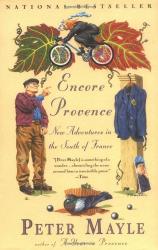Excerpt
Excerpt
Encore Provence

From Chapter One
I think it was the sight of a man power-washing his underpants that really brought home the differences, cultural and otherwise, between the old world and the new.
It was a cold, still morning in early winter, and the pulsing thumpthump, thumpthump of a high-pressure hose echoed through the village. Getting closer to the sound, it was possible to see, over a garden wall, a laundry line totally devoted to gentlemen's underwear in a stimulating assortment of colors. The garments were under attack, jerking and flapping under the force of the water jet like hanging targets in a shooting gallery. Standing some distance away, out of ricochet range, was the aggressor, in cap and muffler and ankle-high zippered carpet slippers. He had adopted the classic stance of a soldier in combat, feet spread apart, shooting from the hip, a merciless hail of droplets raking back and forth. The underpants didn't stand a chance.
Only a few days before, my wife and I and the dogs had arrived back in Provence after an absence of four years. Much of that time had been spent in America, where we were able to slip back into the comfortable familiarity of a language that was relatively free--although not entirely--from the problems of being socially appropriate or sexually accurate. No longer did we have to ponder the niceties of addressing people as vous or tu, or to rush to the dictionary to check on the gender of everything from a peach to an aspirin. English was spoken, even if our ears were rusty and some of the fashionable linguistic flourishes took a little getting used to.
A friend of below-average height told us he was not considered short any more but "vertically challenged"; the hour, previously a plain old sixty minutes, had sprouted a "top" and a "bottom"; you were not seen leaving a room, but "exiting" it; the economy was regularly being "impacted," as though it were a rogue wisdom tooth; great minds "intuited" where once they had merely guessed; "hopefully," an agreeable word that never harmed a soul, was persistently abused. Important people didn't change their opinions, but underwent a significant "tactical recalibration."
There were many and hideous outbreaks of legalese in everyday speech, reflecting the rise of litigation as a national spectator sport. "Surplusage" was one of a hundred of these horrors. I noticed also that sophisticated and influential Americans--those whose comments are sought by the media--were not content to finish anything but preferred to "reach closure," and I have a nasty feeling that it won't be long before this affectation is picked up by waiters in pretentious restaurants. I can hear it already: "Have you reached closure on your salad?" (This, of course, would only be after you had spent some time bending your "learning curve" around the menu.)
We met, for the first time, the "outster," although we never saw a trace of his more fortunate relative, the inster. We were taught to give up our hopelessly old-fashioned habit of concentrating and instead try "focusing." Every day seemed to bring new and exciting vocabulary options. But these minor curiosities didn't alter the fact that we were surrounded by at least some version of the mother tongue and therefore should have felt quite at home.
Somehow we didn't, although it certainly wasn't for lack of a welcome. Almost everyone we met lived up to the American reputation for friendliness and generosity. We had settled in a house outside East Hampton, on the far end of Long Island, a part of the world that, for nine months a year, is quiet and extremely beautiful.
We wallowed in the convenience of America, in the efficiency and the extraordinary variety of choice, and we practiced native customs. We came to know California wines. We shopped by phone. We drove sedately. We took vitamins and occasionally remembered to worry about cholesterol. We tried to watch television. I gave up taking cigars to restaurants, but smoked them furtively in private. There was even a period when we drank eight glasses of water a day. In other words, we did our best to adapt.
And yet there was something missing. Or rather, an entire spectrum of sights and sounds and smells and sensations that we had taken for granted in Provence, from the smell of thyme in the fields to the swirl and jostle of Sunday-morning markets. Very few weeks went by without a twinge of what I can best describe as homesickness.
Returning to a place where you have been happy is generally regarded as a mistake. Memory is a notoriously biased and sentimental editor, selecting what it wants to keep and invariably making a few cosmetic changes to past events. With rose-colored hindsight, the good times become magical; the bad times fade and eventually disappear, leaving only a seductive blur of sunlit days and the laughter of friends. Was it really like that? Would it be like that again?
There was, of course, only one way to find out.
Encore Provence
- paperback: 240 pages
- Publisher: Vintage
- ISBN-10: 0679762698
- ISBN-13: 9780679762690


